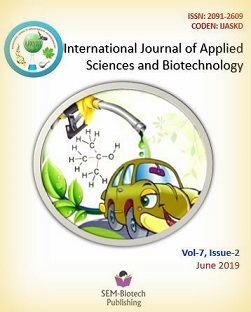Recent Advances in Microbial Production of Butanol as a Biofuel
DOI:
https://doi.org/10.3126/ijasbt.v7i2.24630Keywords:
Biofuels; Genetic Engineering; Clostridia; Butanol, Biofuels, Genetic Engineering, Clostridia; ButanolAbstract
In lieu of rising crude oil prices, exhaustion of petroleum feed stocks and environmental challenges, only renewable fuels have the potential to match the energy requirements of the future. Among the various renewable fuels, butanol has recently gained a lot of attention because of its advantages over other biofuels. Its microbial production by clostridia through ABE fermentation is being explored for improved yield and cost effectiveness. Using lignocellulosic wastes successfully for butanol production through ABE fermentation is a major breakthrough to deal with the future energy crisis. Genetic engineering of microbes to increase the carbon and redox balance, cell recycling, media optimization, mathematical modelling and tolerance improvement strategies are being attempted to overcome the hurdles of high production cost, by products formation leading to low yield and product toxicity. Along with genetic engineering major research is cantered on heterologous host engineering for improved butanol production and tolerance. This review highlights the recent advances in improving yield and tolerance to butanol in both Clostridial and heterologous hosts from genetic engineering and fermentation methodology aspects.
Int. J. Appl. Sci. Biotechnol. Vol 7(2): 130-152




